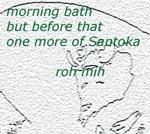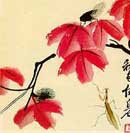The Walk According to Santoka

I fell deeply in love with the haiku of Santoka Taneda (1882-1940). Thanks to those who rescued him from his suicide attempt and brought him to a Zen temple. As described by Dissident Editions, Santoka “devoted his life to moneyless pilgrimage (walking Zen)... Apart from a towel and the clothes he stood up in, virtually all he possessed was just one bowl: the traditional begging-bowl in which he received alms of food or perhaps money, and from which he ate and drank. Such a bowl would have been the most intimate friend and companion... he had a continuing , deep relationship with sake, the rice wine of Japan.”
The following haiku is considered to be his best:
into the begging bowl also-
hailstones
I am most touched by the following haiku:
begging: I accept
the burning sun
Santoka describes his “walking” in the following haiku:
unpleasant days:
days I don’t walk, days without booze,
haikuless days
no path but this one-
I walk alone
aimlessly
I walk through the withered glass
walking on and on-
my only course
walking and begging,
everywhere-
water sound
(source: Dissident Editions; I-ku Haiku)
Santoka defines haiku as follows:
Real haiku is the soul of poetry. Anything that is not actually present in one's heart is not haiku. The moon glows, flowers bloom, insects cry, water flows. There is no place we cannot find flowers or think of the moon. This is the essence of haiku. Go beyond the restrictions of your era, forget about purpose or meaning, separate yourself from historical limitations -- there you'll find the essence of true art, religion, and science.
tr. John Stevens (from www.haikupoet.com)
More haiku by Santoka can be found in The Haiga Pages






2 Comments:
This comment has been removed by a blog administrator.
Santoka with his begging bowl
Ryookan with his begging bowl
Ryokan and Daruma
http://www.amie.or.jp/daruma/Ryokan.html
Greetings from Gabi in Japan
http://happyhaiku.blogspot.com/
Post a Comment
<< Home